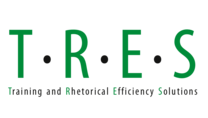Core Competencies in Rhetorical and Dialectical Training

Dialogue
& Effective Conversations
- Effectively facilitate and productively structure a conversation
- Overcome psychological resistance of the dialogue partner
- Strategies for guiding conversations and asserting your key points
Rhetoric & Confident Public Speaking
- Speaking in front of an audience with self-assurance and the ability to captivate
- Processing and refining content in a rhetorical way
- Training nonverbal communication
Argumentation
& Productive Criticism
- Finding and developing key arguments
- Identifying and delivering consistent argument structures
- Critical testing of opposing argumentation
Civilized
Disagreement & Constructive Dispute
- Interacting productively in tense conversations
- Non-argumentative handling of opposing positions
- Disagreeing agreeably by distinguishing between speaker and position
Innovative Methods: Three Pillars of TRES

Over and
above regular training techniques, the trainers are specialized in three
innovative training methods, which interlink research results and practical experience. All methods
can be combined with
each other:
1)
Intensive Interval Training
The first concept combines short keynotes with
according practical exercises in order to achieve a synergetic balance of
theoretical input and practical training that is applicable to day-to-day
business life. The
concept is especially apt for training larger groups. In addition
to this it offers
great opportunities for productive networking.
2)
Cooperative Training
The
cooperative concept further enhances the intensity of the training by adding
the chance to interact
with two trainers. What is more, exercise methods that are not feasible in regular training concepts become
possible.
3)
Training & Coaching Hybrid
The combination
of a one or two day team training with an individual coaching of each participant
perfectly highlights the strength of both methods. Any individual needs that
appear during the team training can be assessed directly during the individual
coaching.